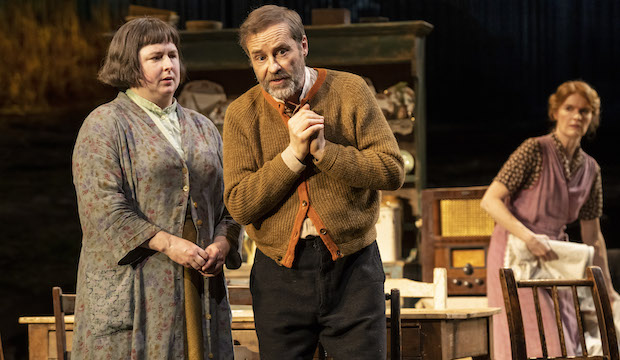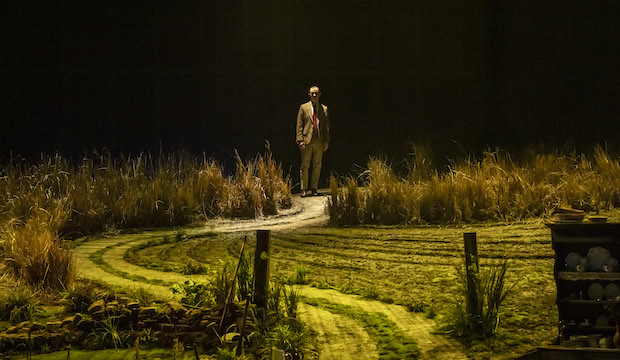Dancing at Lughnasa, National Theatre review ★★★★★
Fuelled by TV talent, Josie Rourke’s timely revival of Brian Friel’s Dancing at Lughnasa finds fresh relevance in our post-pandemic landscape
Bláithín Mac Gabhann (Rose), Alison Oliver (Chris), Louisa Harland (Agnes) & Siobhán McSweeney (Maggie) in Dancing at Lughnasa at the National Theatre. Photo: Johan Persson
Familiar faces from prominent Irish TV shows are brought together on stage in Josie Rourke’s production of Dancing at Lughnasa. Father Ted’s Ardal O'Hanlon, Derry Girls’ Louisa Harland and Siobhán McSweeney, Conversations With Friends’ Alison Oliver and screen regular Justine Mitchell all star. It’s a faithful production of Brian Friel’s memory play, loosely based on his experience of growing up in a household of unmarried women, but what’s most apt about Rourke’s revival is its timing: in our post-lockdown landscape, the ennui of the Mundy sisters, holed up in a house together with memories of celebratory get-togethers and a feeling of unfulfilled potential holds a resonance that might have been lost on audiences watching earlier productions of the 1990 play.
Set in the rural north of Ireland in 1936 at the time of the harvest festival of Lughnasa, the play takes us into the family home of the five grown-up Mundy sisters, as they’re remembered by the story’s narrator, Michael. He’s the son of the youngest sister Chris, born out of wedlock when his travelling salesman father Gerry walked out.

Siobhán McSweeney (Maggie), Ardal O'Hanlon (Jack) and Justine Mitchell (Kate) in Dancing at Lughnasa at the National Theatre. Photo: Johan Persson
There’s love in this home, but also crippling financial worry as the late arrival of the Industrial Revolution threatens to derail the sisters’ glove-making business. The teaching career of older sister Kate, the de facto matriarch of the family, is also under threat, spurred on by the return from Africa of the sisters’ missionary brother Father Jack, who has lost his Catholic faith along the way.
Upbeat reels played over an erratic gramophone inspire brief moments of fervid dancing in the family kitchen, but act as a teasing reminder of a more exciting life being lived elsewhere.
Robert Jones’s set is a visual masterpiece. A wall-less kitchen lets us peer inside the cosy family set-up, beyond which a garden leads to a dusty track that winds away out of view, bordered by the tall, browning crops of late summer, which are lent a golden hue by Mark Henderson’s lighting. In the background, a towering tree and mountain range are distorted by a fringing of drapes, adding a dream-like quality to Michael’s recollections of his childhood.

Tom Vaughan-Lawlor (Michael) in Dancing at Lughnasa at the National Theatre. Photo: Johan Persson
Rourke’s production captures the feisty dynamics between the Mundys, and the sense the kitchen is the nucleus into which gossip from the outside world is filtered and dissected. Mitchell brings an appropriate frostiness to Kate, who’s fearful of the outside world and preoccupied with the family’s reputation within it. Oliver captures Chris’s lovelorn weakness in the company of Gerry (a rascally Tom Riley), while McSweeney – a natural comic – prevents the story getting too heavy as the riddle-loving Maggie, leaning into her character’s yearning to perform through little bows and trots. Agnes and Father Jack, the family’s two dark horses who are smiley but secretive, are trickier parts to land, but Harland and O'Hanlon do decent jobs respectively.
Through the story’s narrator Michael (an earnest Tom Vaughan-Lawlor), Friel tells, rather than shows, us the fractures set to fell this family. In Rourke’s slow and gentle production, the fondness within the Mundy home before it falls apart makes us feel the family’s impending implosion all the more keenly.
Set in the rural north of Ireland in 1936 at the time of the harvest festival of Lughnasa, the play takes us into the family home of the five grown-up Mundy sisters, as they’re remembered by the story’s narrator, Michael. He’s the son of the youngest sister Chris, born out of wedlock when his travelling salesman father Gerry walked out.

Siobhán McSweeney (Maggie), Ardal O'Hanlon (Jack) and Justine Mitchell (Kate) in Dancing at Lughnasa at the National Theatre. Photo: Johan Persson
There’s love in this home, but also crippling financial worry as the late arrival of the Industrial Revolution threatens to derail the sisters’ glove-making business. The teaching career of older sister Kate, the de facto matriarch of the family, is also under threat, spurred on by the return from Africa of the sisters’ missionary brother Father Jack, who has lost his Catholic faith along the way.
Upbeat reels played over an erratic gramophone inspire brief moments of fervid dancing in the family kitchen, but act as a teasing reminder of a more exciting life being lived elsewhere.
Robert Jones’s set is a visual masterpiece. A wall-less kitchen lets us peer inside the cosy family set-up, beyond which a garden leads to a dusty track that winds away out of view, bordered by the tall, browning crops of late summer, which are lent a golden hue by Mark Henderson’s lighting. In the background, a towering tree and mountain range are distorted by a fringing of drapes, adding a dream-like quality to Michael’s recollections of his childhood.

Tom Vaughan-Lawlor (Michael) in Dancing at Lughnasa at the National Theatre. Photo: Johan Persson
Rourke’s production captures the feisty dynamics between the Mundys, and the sense the kitchen is the nucleus into which gossip from the outside world is filtered and dissected. Mitchell brings an appropriate frostiness to Kate, who’s fearful of the outside world and preoccupied with the family’s reputation within it. Oliver captures Chris’s lovelorn weakness in the company of Gerry (a rascally Tom Riley), while McSweeney – a natural comic – prevents the story getting too heavy as the riddle-loving Maggie, leaning into her character’s yearning to perform through little bows and trots. Agnes and Father Jack, the family’s two dark horses who are smiley but secretive, are trickier parts to land, but Harland and O'Hanlon do decent jobs respectively.
Through the story’s narrator Michael (an earnest Tom Vaughan-Lawlor), Friel tells, rather than shows, us the fractures set to fell this family. In Rourke’s slow and gentle production, the fondness within the Mundy home before it falls apart makes us feel the family’s impending implosion all the more keenly.
TRY CULTURE WHISPER
Receive free tickets & insider tips to unlock the best of London — direct to your inbox
| What | Dancing at Lughnasa, National Theatre review |
| Where | National Theatre, South Bank, London, SE1 9PX | MAP |
| Nearest tube | Waterloo (underground) |
| When |
06 Apr 23 – 27 May 23, 7:30 PM – 10:00 PM |
| Price | £20 - £86 |
| Website | Click here for more information and to book |